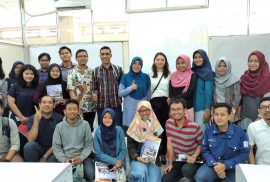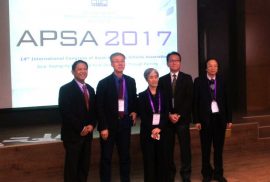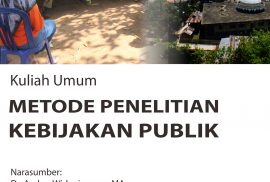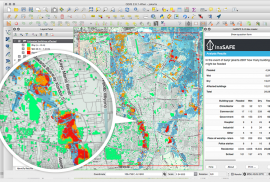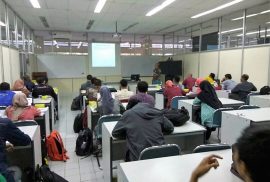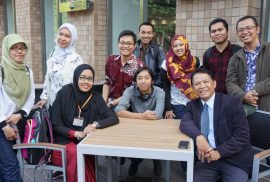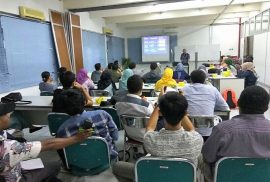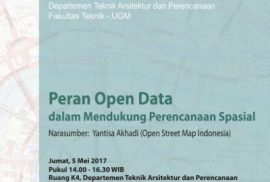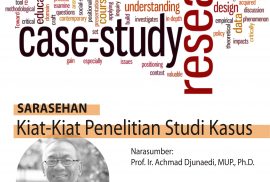MPWK – MPKD UGM. Tuesday, 10th April 2018, MPWK – MPKD UGM will arrange a public lecture in ““The Housing Challenge: 10 Relevant Questions for The Asian Context ”. The speaker of this lecture is Alonso Alaya, Senior Expert, Housing, Institute for Housing and Urban Development Studies of Erasmus University Rotterdam. The agenda will be held in B1 and B2, South Wing, Department Architecture and Planning Building, at 11.00 am – 12.30 pm. This discussion is recommended for all MPKD and PWK (UG of Urban and Regional Planning) student.
MPKD-UGM. Wednesday, November 1st 2017, IHS Marketing & Communicatiob Officer, Erasmus University of Rotterdam, Desislava Yordanova, came to MPKD UGM in order to discuss collaboration between MPKD and IHS as well as promoting programs organized by IHS and which related to the knowledge area of MPKD and S1 PWK UGM (Bachelor and Master Program of Urban and Regional Planning).
Yordanova started its activities in MPKD by conducting promotion sessions conducted by IHS, ie master program, Ph.D program, short course, and tailor made training. This activity was attended by approximately 20 people coming from MPKD students themselves, as well as undergraduate students of urban and regional planning. She started the session by describing the reasons to choose study in The Netherlands. She added that the determination of the programs in IHS is the availability of various specializations and short learning time for master, which is 12 months. This explanation session followed by a question and answer session and closed with a photo session with the participants.

MPKD -UGM. On 12 – 14 October, 2017, the head of Master Program of Urban and Regional Planning (MPKD), UGM attended the APSA (Asian Planning Schools Association) International Congress, at the School of Architecture, Tshinghua University, Beijing. The APSA Congress is biennial activity of an organization that coordinates planning schools in Asia which discuss about the current (urban and regional) planning issues.
The thematic issue of APSA Congress 2017 is “Reshaping Urban and Rural Development Through Planning”. This theme seeks to bridge the gap that arose due to the classic problems in Asia’s urban and rural areas. Planning takes a significant role in shaping and bridging the continuity of interactions between these two areas.
MPKD – UGM. Tuesday, 23th Mei 2017, MPKD UGM will arrange a public lecture in “Public Policy Research Methods”. The speaker of this lecture is Dr. Ambar Widaningrum, MA. The agenda will be held in M1, North Wing, Department Architecture and Planning Building, at 9.30 – 11.30 am. This discussion is recommended for all MPKD student.
MPKD – UGM. On Friday – 05 May 2017 Undergraduate Program of Urban and Regional Planning and Spatial Planning Supporting Laboratory carred out Planning Lecture Series activities with Yantisa Akhadi from Open StreetMap Indonesia entitled “Open Data Role in Supporting Spatial Planning”.
MPKD – UGM. On Thursday, May 4, 2017, MPKD and PWK held the research discussion series with Prof. Ir. Achmad Djunaedi, MUP., Ph.D with the theme of “Preparing Case Study Research”. The activities were held in M1, 3rd Floor, North Wing Building, Department of Architecture and Planning.
MPKD – UGM. In order to Coordination and Monitoring of the Implementation of the Master Program of Professional Human Resources Development IV (PHRD IV). MPKD together with BAPPENAS visit Japan on 4 – 12 May 2017.
MPKD UGM. Monday, April 17, 2017 in B1 and B2, 1st Floor, South Wing Building Department of Architecture and Planning, there was Discussion Series with Prof. Ir. Achmad Djunaedi, MUP., Ph.D entitled “How to Prepare Research Proposals”.
MPKD – UGM. Friday, 5th May 2017, Undergraduate Program of Urban and Regional Planning with Spatial Supporting Data Laboratory will hold Planning Lecture Series with Yantisa Akhadi from Open Street Map Indonesia entitle: “Open Data for Supporting System of Spatial Planning”. The agenda will be held in K4 Classroom, West Wing, Department Architecture and Planning Building, at 2.00 – 4.30 pm. This discussion is recommended for all MPKD student, especially for who has interest in Decision Supporting System for Planning thematic research issues.
MPKD – UGM. Thursday , 4th May 2017, MPKD will hold discussion series with Prof. Ir. Achmad Djunaedi, MUP., Ph.D entitle: “Preparing Case Study Research”. The agenda will be held in M1 Classroom, North Wing, Department Architecture and Planning Building, at 3.30 – 5.30 pm. This discussion is recommended for all MPKD student.
Contact Person: Rendy B. Aditya (087883111301)
Poster can be downloaded here.


